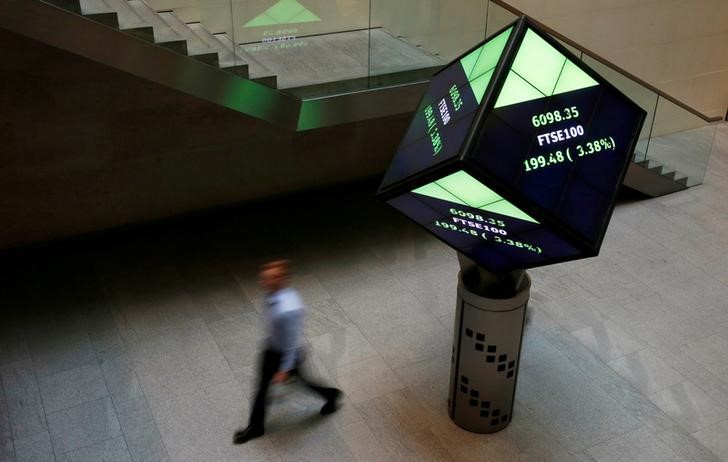By Danilo Masoni and Helen Reid
LONDON/MILAN (Reuters) - European shares sealed their best quarter since 2015 on Friday, with inflows to European equities picking up on strong economic data and corporate earnings, despite a packed political calendar ahead.
The pan-European STOXX 600 (STOXX) index was up 0.1 percent, ending the first quarter of 2017 with a gain of 5.5 percent, its third straight quarterly gain.
While Britain's FTSE 100 (FTSE) fell 0.6 percent, Germany's DAX (GDAXI) gained 0.5 percent and France's CAC (FCHI) rose 0.7 percent.
The rally in European shares has been driven by improving economic data, strong earnings and a series of M&A deals in the region, which have more than offset worries over the political future of the region ahead of elections in France and Germany and Britain's divorce from the European Union.
European equities attracted their largest inflows in 60 weeks, with $1.5 billion this week, the latest data from Bank of America (NYSE:BAC) Merrill Lynch showed, as investor concerns over a victory of far-right candidate Marine Le Pen in the upcoming French presidential election subsided.
The French election remains the key political risk for investors in the quarter ahead.
Germany's DAX (GDAXI), seen as an alternative for investors wary of French assets, outperformed major European peers this quarter, up 6.8 percent and tantalisingly close to its April 2015 record high.
Spain's IBEX (IBEX) was the overall winner, notching up 11.2 percent gains, while Britain's FTSE 100 (FTSE) underperformed peers, gaining 2.5 percent over the quarter.
In sectors, tech stocks (SX8P) were the top gainers, up 13 percent over the quarter, as investors buy into the industry. Energy stocks performed the worst, down 3 percent.
On Friday, South Africa-exposed stocks were the top fallers in heavy volumes after President Jacob Zuma fired his respected finance minister in a late-night cabinet reshuffle.
Asset manager Investec (L:INVP) was the biggest loser on the STOXX, down 9.9 percent, its biggest fall since the last time Zuma spooked markets by suddenly dismissing then finance minister Nhlanhla Nene in December 2015.
Other stocks exposed to the African country were also among the top losers. Insurer Old Mutual (L:OML) fell 7.5 percent, healthcare firm Mediclinic (L:MDCM) dropped 6.2 percent and paper company Mondi (L:MNDI) declined 2.5 percent, while German-listed South African retailer Steinhoff (DE:SNHG) fell 3 percent.
"Stocks with exposure to South Africa plunged amid deep fears about the state of the country's government following the sacking of respected finance minister Pravin Gordhan," said ETX Capital analyst Neil Wilson in a note.
South Africa's rand and government bonds recovered ground slightly after an initial sharp fall on the news.
Another top loser on the STOXX was Danish biotechnology firm Genmab (CO:GEN). Its shares fell after partner Janssen (N:JNJ) decided not to start the second stage of a study of a key drug.
Among gainers was German utility RWE (DE:RWEG) which rose 2.7 percent after Oddo Seydler upgraded the stock to "buy" from "neutral". UK motor insurer Direct Line (L:DLGD) rose 3.4 percent, also helped by a broker upgrade.

UK mid cap Shawbrook Group (L:SHAW) rallied 9.5 percent after the UK lending banks said it had received a buyout offer.